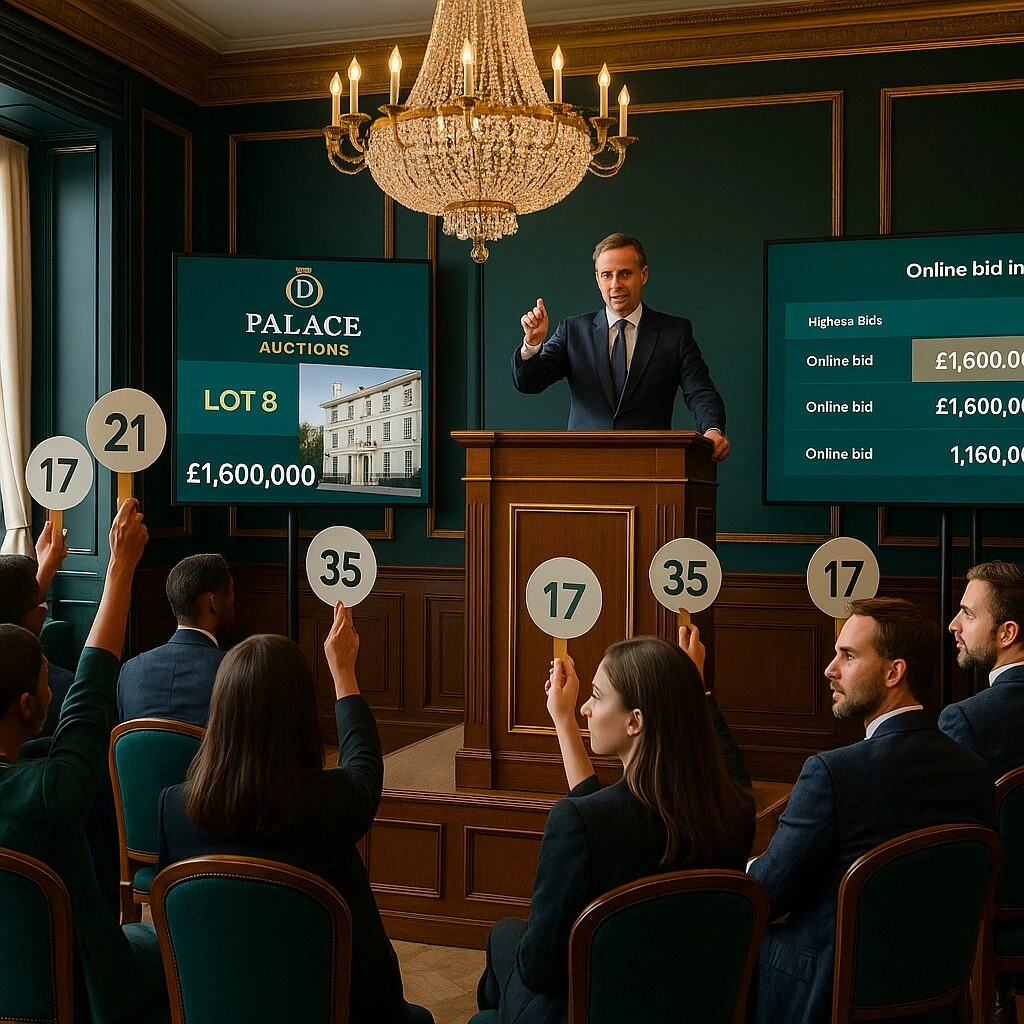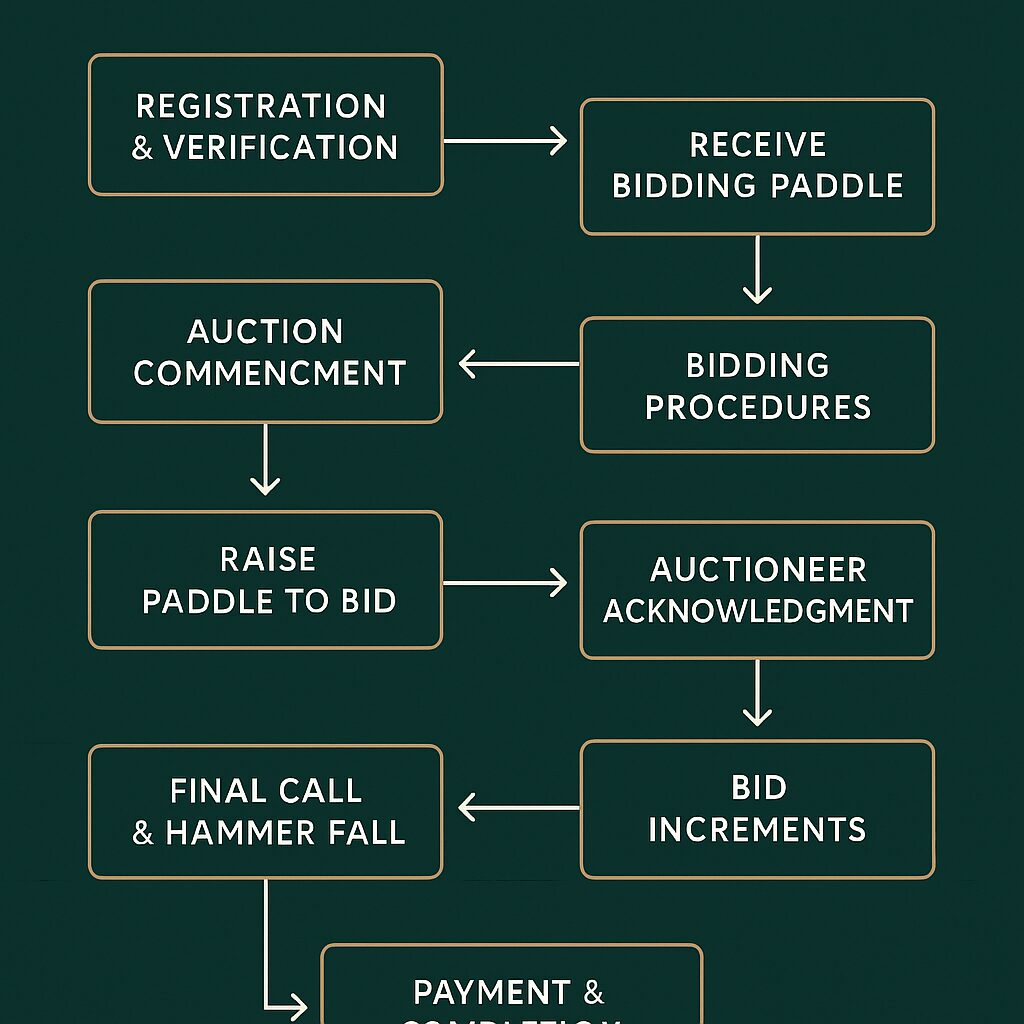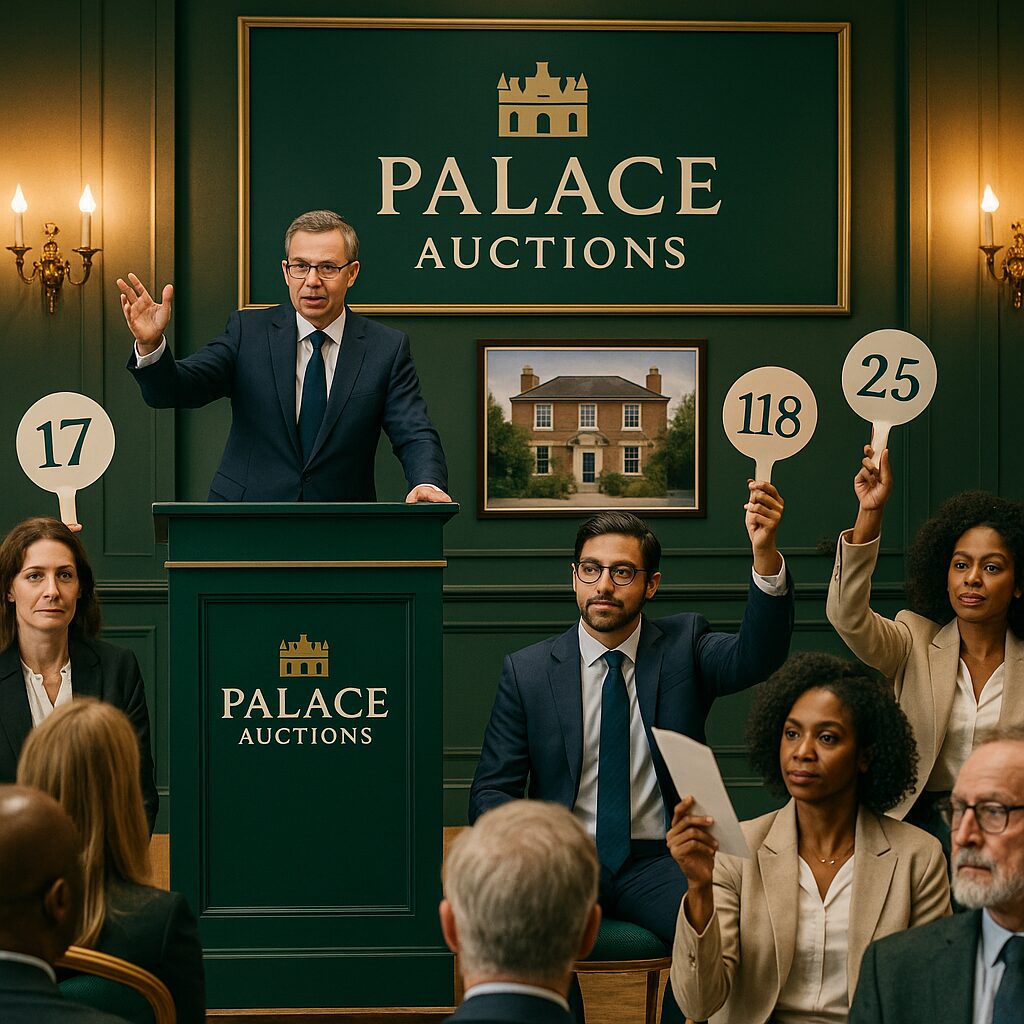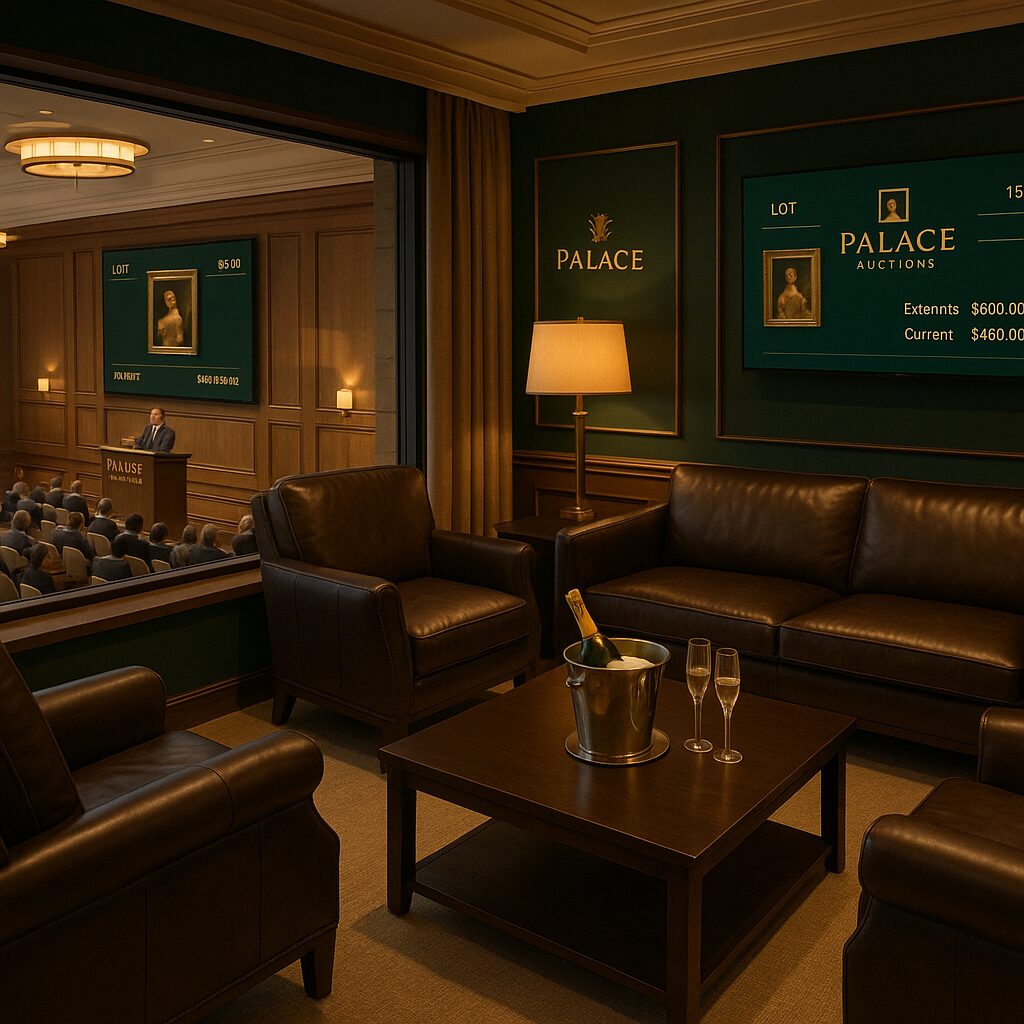

This guide covers traditional room-only auctions, where everyone attends in person, and hybrid formats, which mix in-person with remote bidding. Each format needs different strategies, but both follow the same legal rules. UHNWI bidders have a 26.7% success rate, compared to 16.7% for standard bidders. Knowing room dynamics and using professional support can give you a competitive edge.
Critical Market Context: With 40% of London auction bidders from overseas and a 441% rise in 18-24 year-olds, your in-person bidding guide should cater to various experience levels. Highlight Palace Auctions’ VIP services for international HNWI and UHNWI clients, who achieve 26.7% success rates versus standard bidders’ 16.7%.
Our analysis shows in-person auctions have a 19.5% success rate, while online-only auctions reach 17.3%. The best results come from an overseas and in-person combination, at 21.7%. This page should stress the benefits of attending auctions physically, while ensuring accessibility for all.
In-person bidding expertise is vital as UK property markets embrace both traditional and hybrid formats. Room attendance offers strategic advantages, with 19.5% success rates compared to 17.3% for online-only. Whether you’re a first-time buyer or an experienced investor, understanding in-person procedures, compliance, and etiquette is key. Palace Auctions London ensures accessibility for international buyers, with 40% of participants from overseas and VIP services for HNWI and UHNWI clients.
Registration is crucial for successful auction participation. Complete it 48–72 hours before the event for verification. Required documents include:
Palace Auctions’ registration desk opens 90 minutes before the auction. Although you can register at the last minute, pre-registration makes entry smoother. HNWI and UHNWI clients enjoy private registration suites with dedicated advisers.
Anti-money laundering (AML) compliance includes customer due diligence (CDD), verifying beneficial ownership for companies, and screening against international databases. Overseas participants should allow extra time for verification, with Palace Auctions’ multilingual staff ready to help.
Arrive 30-45 minutes early to familiarize yourself with the venue, collect your bidding paddle, and check for last-minute changes. In traditional auctions, all activity happens in the main hall, while hybrid formats have extra screens for online bids.
Seating strategy matters. Experienced bidders choose spots with clear views of both the auctioneer and serious participants. Front rows offer the best view of the auctioneer but limit visibility of competitors. Middle seats balance visibility and anonymity, while rear spots allow for a broader view but may need more assertive bidding.
VIP clients have exclusive viewing areas with dedicated bid assistants for comfort and strategic positioning. Private booths with direct communication to auction staff allow discreet participation in high-value transactions.
When your lot comes up, the auctioneer will announce the property details and any changes. Following SPS Groundworks v Mahil [2022], parties must disclose material defects verbally before the bidding process begins. Guide prices state the least expectations of sellers, with reserves set at 10% above single-figure guides.
Bidding increments vary by property value—usually £1,000-£5,000 for properties under £500,000, rising to £10,000-£25,000 for premium lots. The auctioneer controls increments but may accept irregular bids to disrupt competitors’ rhythms. Our analysis shows that odd-numbered bids can unsettle opponents.
When the hammer falls, it establishes a legally binding contract. Sign the memorandum and pay your 10% deposit (at least £3,000-£5,000). Failing to complete results in deposit forfeiture and possible damages claims, so financial certainty is crucial.

UK auction participation requires strict legal compliance, beginning with thorough identity verification. Auction venues in London need council registration for specific goods. Non-compliance could lead to £5,000 fines. Participants must meet:
Review legal packs containing title documents, searches, special conditions, and TA6 Property Information Forms (2024 edition) before bidding. Sellers must disclose material defects with diligence; they cannot rely on “deemed knowledge” clauses.
Payment restrictions limit cash transactions to £6,000 each, with larger deposits needing bank transfers or drafts. Credit cards are usually not accepted for compliance reasons, so arrange cleared funds in advance.
The hammer fall creates immediate binding contracts between buyer and seller. Both parties must complete within set timeframes—28 days for traditional auctions and 56 days for Modern Method formats. Insurance responsibility transfers immediately upon exchange, so ensure building coverage is pre-arranged.
Buyer’s premiums average 2-3% + VAT, with our analysis showing in-person premiums average £9,229 versus £10,819 for online formats—a 17.2% saving due to lower technology costs. Additional fees may include administration charges (£1,000-£1,200), seller’s legal contributions (£500-£1,500), and search reimbursements (£300). Failing to complete incurs severe penalties, including deposit loss, interest charges, potential resale at lower prices, and legal action. Professional representation by solicitors familiar with auction procedures is essential.
Traditional room-only auctions create high-energy competitive environments where everyone attends physically, allowing immediate feedback between bidders and auctioneers. This format attracts cash-ready investors who can make quick decisions. Statistical analysis confirms these auctions achieve the highest success rates at 19.5%, benefiting experienced participants who read room dynamics effectively.
Room-only formats excel for unique or high-value properties, where physical inspection and atmosphere justify attendance. The concentrated buyer pool creates transparent competition, enabling strategic responses to bids. Auctioneers use room energy to push prices, sometimes raising final values by 15-25% above guides.
Hybrid formats combine in-room excitement with global accessibility, drawing a wider range of buyers, including international investors and busy professionals. Real-time integration of online, telephone, and proxy bids displayed on screens ensures transparency while expanding potential buyer pools by 63%.
This format suits Palace Auctions’ international clientele, with 40% of London bidders from overseas. Technology allows participation from anywhere while keeping the same legal rules—contracts exchange immediately with standard deposits and completion needs. Hybrid auctions blend traditional integrity with modern accessibility, benefiting sellers by maximising exposure and buyers by providing convenience.
Professional conduct boosts auction effectiveness and preserves market integrity. Maintain a courteous demeanor towards fellow bidders, auction staff, and property representatives. Aggressive tactics or insults can lead to ejection. Stay quiet during active bidding to ensure clear communication between the auctioneer and participants.
Strategic positioning and presence:
Mobile phones should be silenced, with screens dimmed to avoid disruption. Photography or recording typically requires permission, as many auction houses prohibit unauthorized documentation to protect privacy and security.
Successful bidders set firm maximum limits before entering, based on independent valuations rather than competitive dynamics. Our analysis reveals that emotional bidding leads to 20-30% overpayment compared to predetermined strategies. Counter psychological biases through:
Disrupting competitor rhythm: Use irregular increments like £201,500 versus £200,000, breaking expected patterns and forcing recalculation. Deliberate pauses before bidding interrupt the auctioneer’s cadence, particularly effective when caught between two aggressive bidders.
Managing competitive arousal: Bring trusted advisors to maintain objectivity when excitement peaks. Check physical stress indicators—increased heart rate, sweating, tunnel vision—signalling emotional rather than rational decision-making. Step outside briefly between lots to reset your psychological state.
Reading room dynamics: Observe competitor behaviors, identifying impulsive versus strategic bidders. Aggressive early bidding may indicate emotional investment vulnerable to pressure, while patient observers often represent serious competition with deep resources.

Palace Auctions London provides comprehensive VIP support tailored to high-net-worth individuals requiring discretion, efficiency, and excellence. Services include:
VIP registration occurs in private suites away from the main reception, ensuring confidentiality while expediting verification processes. Dedicated phone lines connect directly to auction room representatives, allowing for real-time changes in instructions without the need for physical presence.

Overseas participants enjoy specialised support that acknowledges their unique requirements, and 40% of participants in London auctions come from international locations. Enhanced services include:
Pre-arrival preparation:
Auction day support:
Post-auction help:
Statistical analysis demonstrates that overseas bidders achieve success rates of 20.3%, compared to 16.8% for domestic bidders—this 20.3% advantage may reflect greater determination and resources. Combined with in-person attendance, international buyers achieve the highest success rate at 21.7%, validating the strategic importance of physical participation.
Palace Auctions’ Mayfair venue offers complete accessibility, including step-free access, disabled parking facilities, accessible restroom facilities, and hearing loop systems. Wheelchair users receive priority seating with unobstructed sightlines, while assistance dogs are welcomed throughout.
Virtual participation options accommodate those unable to attend physically, including live streaming that allows real-time bidding, telephone bidding with dedicated operators, proxy bidding through authorised representatives, and negotiation for unsuccessful lots after the auction. These alternatives ensure inclusive participation regardless of physical limitations or geographic constraints.
Transport links include four Underground stations within 500 metres, extensive bus routes, and dedicated taxi ranks. International visitors appreciate proximity to major hotels and Heathrow Express connections, minimising transit complexity on auction day.
Q: Can first-time buyers succeed at in-person auctions? A: Absolutely. First-time buyers benefit from transparent pricing and immediate purchase certainty. Preparation through legal pack review, pre-arranged financing, and setting firm limits ensures success regardless of experience level.
Not possible to remove the adverb. A: Legal frameworks remain identical—both create binding contracts upon hammer fall with standard deposit and completion requirements. The only difference involves bidder participation methods.
Q: What advantages do HNWI/UHNWI clients receive? A: Beyond VIP services, high-net-worth clients prove 26.7% success rates versus 16.7% standard, reflecting enhanced resources, professional representation, and strategic bidding capacity.
Q: Can overseas buyers take part without UK presence? A: Yes, through telephone, online, or proxy bidding. Yet, our data show that in-person attendance improves success rates by 12.7%, particularly for competitive lots.
Q: What happens if I exceed my intended budget? A: Winning bids create legally binding obligations. Ensure absolute financial certainty before bidding, as withdrawal results in deposit forfeiture and potential legal action.
Outbound Links
Internal Link
“Compare with our online auction bidding guide for remote participation options.”
Page Last Updated: 11 October 2025, 12:56 GMT
Enter your email address and we will send you a link to change your password.